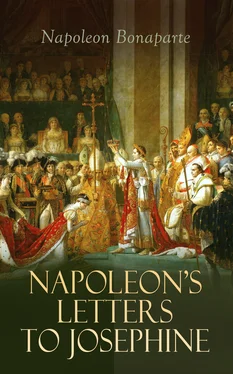December 29th. —Coalition of Russia, Austria, and England against France.
Events of 1799.
Napoleonic History.— January 23rd. — Desaix defeats Mourad Bey at Samhoud (Upper Egypt). February 3rd.—Desaix defeats Mourad Bey at the Isle of Philae (near Assouan)—furthest limit of the Roman Empire. Napoleon crosses Syrian desert and takes El Arish (February 20th) and Gaza (February 25th), captures Jaffa (March 7th) and Sour, formerly Tyre (April 3rd). Junot defeats Turks and Arabs at Nazareth (April 8th), and Kléber defeats them at Mount Tabor (April 16th). Napoleon invests Acre but retires (May 21st), re-enters Cairo (June 14th), annihilates Turkish army at Aboukir (July 25th); secretly sails for France (August 23rd), lands at Frejus (October 9th), arrives at Paris (October 13th); dissolves the Directory (November 9th) and Council of Five Hundred (November 10th), and is proclaimed First Consul (December 24th).
General History.— January 10th. —Championnet occupies Capua.
January 20th. —Pacification of La Vendée by General Hédouville.
January 23rd. —Championnet occupies Naples.
March 3rd. —Corfu taken from the French by a Russo-Turkish force.
March 7th. —Massena defeats the Austrians, and conquers the country of the Grisons.
March 25th. —Archduke Charles defeats Jourdan at Stockach.
March 30th. —Kray defeats French (under Schérer) near Verona,
April 5th. —And again at Magnano.
April 14th. —Suwarrow takes command of Austrian army at Verona;
April 22nd. —Defeats French at Cassano, with heavy loss.
April 28th. —French plenipotentiaries, returning from Radstadt, murdered by men in Austrian uniforms—Montgaillard thinks by creatures of the Directory.
May 4th. —Capture of Seringapatam by General Baird.
May 12th. —Austro-Russian army checked at Bassignana.
May 16th. —Sièyes becomes one of the Directory.
May 20th. —Suwarrow takes Brescia,
May 24th. —And Milan (citadel).
June 5th. —Massena defeated at Zurich by Archduke Charles; and Macdonald ( June 19th ) by Suwarrow at the Trebbia.
June 18th. —Gohier, Roger-Ducos, and Moulin replace Treilhard, Laréveillère-Lépeaux, and Merlin on the Directory.
June 20th. —Turin surrenders to Austro-Russians.
June 22nd. —Turkey, Portugal, and Naples join the coalition against France.
July 14th. —French carry their prisoner, Pope Pius VI., to Valence, where he dies ( August 29th ).
July 22nd. —Alessandria surrenders to Austro-Russians.
July 30th. —Mantua, after 72 days' siege, surrenders to Kray.
August 15th. —French defeated at Novi by Suwarrow. French lose Joubert and 20,000 men.
August 17th. —French, under Lecombe, force the St. Gothard.
August 27th. —English army disembark at the Helder.
August 30th. —Dutch fleet surrendered to the British Admiral.
September 19th. —Brune defeats Duke of York at Bergen.
September 25th. —Massena defeats allies at Zurich, who lose 16,000 men and 100 guns. "Massena saves France at Zurich, as Villars saved it at Denain."— Montgaillard.
October 6th. —Brune defeats Duke of York at Kastrikum.
October 7th. —French take Constance.
October 16th. —Saint-Cyr, without cavalry or cannon, defeats Austrians at Bosco.
October 18th. —Capitulation at Alkmaar by Duke of York to General Brune. "The son of George III. capitulates at Alkmaar as little honourably as the son of George II. had capitulated at Kloster-Seven in 1757."— Montgaillard.
November 4th. —Melas defeats French at Fossano.
November 13th. —Ancona surrendered to the Austrians by Monnier, after a six months' siege.
November 24th. —Moreau made commander of the armies of the Rhine (being in disgrace, has served as a volunteer in Italy most of this year); Massena sent to the army of Italy.
December 5th. —Coni, the key of Piedmont, surrenders to the Austrians.
December 14th. —Death of George Washington.
December 15th. —Battle of Montefaccio, near Genoa. Saint-Cyr defeats Austrians.
Events of 1800.
February 11th. —Bank of France constituted.
February 20th. —Kléber defeats Turks at Heliopolis.
May 3rd. —Battle of Engen. Moreau defeats Kray, who loses 10,000 men, and—
May 5th. —Again defeats Austrians at Moeskirch.
May 6th.—Napoleon leaves Paris.
May 8th.—Arrives at Auxonne, and on the 9th at Geneva, from thence moves to Lausanne (May 12th), where he is delighted with reception accorded to the French troops, and hears of Moreau's victory at Bibernach (May 11th). On the 14th he hears of Desaix's safe arrival at Toulon from Egypt, together with Davoust, and orders the praises of their past achievements to be sung in the Moniteur. The same day writes Massena that in Genoa a man like himself (Massena) is worth 20,000. On the 16th is still at Lausanne.
No. 1.
To Josephine, at Paris.
Lausanne, May 15, 1800.
I have been at Lausanne since yesterday. I start to-morrow. My health is fairly good. The country round here is very beautiful. I see no reason why, in ten or twelve days, you should not join me here; you must travel incognito, and not say where you are going, because I want no one to know what I am about to do. You can say you are going to Plombières.
I will send you Moustache,16 who has just arrived.
My very kindest regards to Hortense. Eugène will not be here for eight days; he is en route .
Bonaparte.
No. 2.
To Josephine, at Paris.
Torre di Garofolo, May 16, 1800.
I start immediately to spend the night at Saint-Maurice. I have not received a single letter from you; that is not well. I have written you by every courier.
Eugène may arrive the day after to-morrow. I have rather a cold, but it will have no ill effects.
My very kindest regards to you, my good little Josephine, and to all who belong to you.
Bonaparte.
May 17th-19th.—At Martigny, "struggling against ice, snow-storms, and avalanches," and astonishing the great St. Bernard "with the passage of our 'pieces of 8,' and especially of our limbers—a new experience for it." On May 20th he climbed the St. Bernard on a mule, and descended it on a sledge. On May 21st he is at Aosta, hoping to be back in Paris within a fortnight. His army had passed the mountain in four days. On May 27th he is at Ivrea, taken by Lannes on the 24th.
No. 3.17
From Tennant's Tour, &c. , vol. ii.]
11 P.M.
Vercelli. Murat ought to be at Novaro to-night. The enemy is thoroughly demoralised; he cannot even yet understand us. I hope within ten days to be in the arms of my Josephine, who is always very good when she is not crying and not flirting. Your son arrived this evening. I have had him examined; he is in excellent health. Accept a thousand tender thoughts. I have received M.'s letter. I will send her by the next courier a box of excellent cherries.
We are here—within two months for Paris.—Yours entirely,
N. B.
To Madame Bonaparte. (Address not in Bonaparte's writing.)
June 1st. —First experiments with vaccination at Paris, with fluid sent from London.
On June 2nd Napoleon enters Milan, where he spends a week.
No. 4.
To Josephine, at Paris.
Читать дальше












